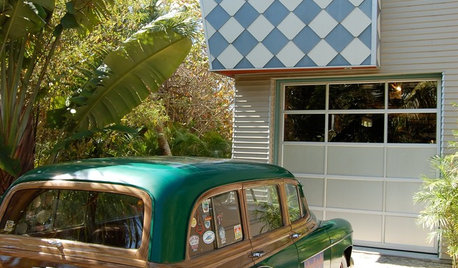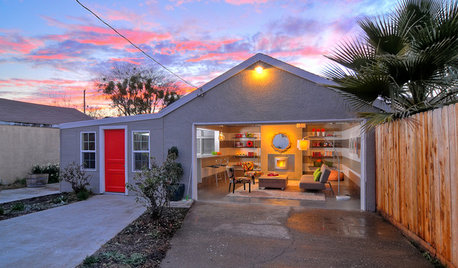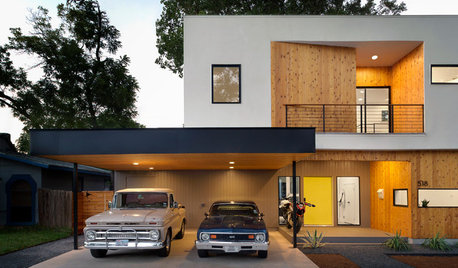Banning petrol cars
Ali Kazemi
5 years ago
Featured Answer
Sort by:Oldest
Comments (34)
Mark Bischak, Architect
5 years agoSteve J
5 years agoRelated Discussions
OT: Burn Bans & Fireworks: Can you? Should you?
Comments (23)Last night while I was out working in the garden before sunset, two or three departments a few miles west of us were dispatched to a grassfire that was caused by fireworks. I didn't hear the call when they dispatched it...I might have been over at the chicken coop locking it up for the night....but I could tell from the stress in their voices that they were racing to get to the fire before it could reach the house. They did it. They did make a special point of telling the dispatcher to write down on the call log that the fire was started by fireworks. I notice they've been doing that all week. I think they want "the powers that be" to understand just how many fires are being started by fireworks even though we do have a burn ban. Yesterday our county commissioners extended our burn ban for another 30 days. Hallelujah! And, in a move I'm not sure they've ever made before, they denied a local charitable/research foundation (one that is greatly admired and respected worldwide) a permit to conduct a prescribed burn. Under Oklahoma law, county commissioners can grant such prescribed burn permits even during burn bans, provided certain conditions are met, and that includes paying firefighers (via a donation to their department) to be on the property during the burn and also they have to agree that if the fire escapes the property and additional firefighters are called to fight it, those departments will be reimbursed for their expenses at FEMA hourly rates. Usually our county commissioners approve the prescribed burn permits for this foundation because it always follows all the rules and rarely if ever has a fire escape from their control. The fact that our commissioners said 'no' to them is a humongous big deal and caught the attention of all the fire departments. I just take it as a sign that our commissioners are as concerned as the rest of us about how dry it is here, and we are not nearly as dry as pretty much everyone else west of I-35. I've linked the upated burn ban page. Yesterday afternoon, when I checked it, there were quite a few more counties that either have enacted a burn ban this week or who have extended an existing ban. I think that currently 46 of our 77 counties have burn bans. Dawn Here is a link that might be useful: Burn Ban Page from OFS Website...See Morepetrol leaking at the high side needle valve
Comments (6)Glad you got it fixed. You might want to consider replacing the bowl gasket washer with the correct one as well as the float bowl gasket to assure no fuel leaks. Since you use the word petrol I’m assuming you’re in <?xml:namespace prefix = st1 ns = "urn:schemas-microsoft-com:office:smarttags" />Europe. Here in the USA you can buy both parts on Ebay for about 5.00 US including shipping. The float bowl washer is ridiculously priced at 3.00 was the lowest I could find, but it may be worth it to prevent fuel loss and a potential fire.. <?xml:namespace prefix = o ns = "urn:schemas-microsoft-com:office:office" /> Briggs & Stratton Float Bowl Gasket Part # 270511 http://www.ebay.com/sch/i.html?_from=R40&_trksid=p2060353.m570.l1313.TR0.TRC0.H0.XBriggs+%26+Stratton+270511.TRS0&_nkw=Briggs+%26+Stratton+270511&_sacat=0 Briggs & Stratton Float Bowl Washer Part # 690618 http://www.ebay.com/sch/i.html?_from=R40%7CR40&_sacat=0&_nkw=Briggs+%26+Stratton+690618&_sop=15...See MoreHawaii First State to Ban Smoking for Under-21's
Comments (34)I'm just thrilled beyond speech to know the human brain's impulse control centers are fully formed when people are 23. That solves that problem. Now for this business of making kids enforce the laws. How stupid is that? Holding a cashier responsible and making THEM a criminal because someone attempts to buy something the "bleeding hearts" don't want them to have. Why not hold the ones BUYING them, or attempting to buy them responsible? Seems funny, MADD and all the others don't care about the ones trying to buy them, only the ones trying to earn a living. Sad situation indeed. They're just poor little children? That's the next claim. So hold the parents liable and let the parents sit in jail for their kids actions. Sounds good to me. Maybe some discipline will come back into the fold. And they only have to worry about it until the "bad" kids are 23 anyway, right?...See MoreAdele is banned from my home
Comments (45)I clicked on the video of Hello when it was posted on FB back at the album launch. Got impatient watching her noodling around driving, making tea, and then gave up after a moment or two of the song. It just didn't move me, someone belting out a Power Ballad. And that's all I know about Adele. Oh, I also tried to listen to the vocal track from SNL that's all over the interwebs, and got bored with that after a moment as well....See MoreAli Kazemi
5 years agoAli Kazemi
5 years agoSteve J
5 years agoAli Kazemi
5 years agojemdandy
5 years agolast modified: 5 years agotoxcrusadr
5 years agoSarah
5 years agoSteve J
5 years agotoxcrusadr
5 years agoJakkom Katsu
5 years agolast modified: 5 years agoopaone
5 years agolast modified: 5 years agoUser
5 years agomtvhike
5 years agoopaone
5 years agoUser
5 years agolast modified: 5 years agotoxcrusadr
5 years agoSteve J
5 years agoopaone
5 years agolast modified: 5 years agoUser
5 years agolast modified: 5 years agotoxcrusadr
5 years agoSolar Texas
5 years agotoxcrusadr
5 years agoopaone
5 years agoTony Stevens
5 years agoopaone
5 years agolast modified: 5 years agotoxcrusadr
5 years agotoxcrusadr
5 years agoTony Stevens
5 years agolast modified: 5 years agotoxcrusadr
5 years agoTony Stevens
5 years agolast modified: 5 years agotoxcrusadr
5 years agolast modified: 5 years ago
Related Stories

FUN HOUZZAre These Cars a Perfect Match for Their Homes?
Shift gears to the driveway or garage and see if you appreciate these pairings as much as we do — then share your own ideal match
Full Story
GARDENING AND LANDSCAPINGCrab Apple Trees Set Off a Stylish English Courtyard
A structure of pleached crab apple trees, bordered by a wildflower meadow, links a minimalist addition to an old house in Buckinghamshire
Full Story
GARAGESStart Your Engines: The Most Popular Garage Photos of 2016
There’s a space for you here, whether you are a total gearhead or need a nice place to park the beloved family truckster
Full Story
FEEL-GOOD HOME10 Ways to Fight Pollen at Home
Keep sneezing and stuffiness to a minimum by making your house as pollen free as possible
Full Story
CURB APPEALHow to Reseal Your Asphalt Driveway
Protect your driveway and keep it looking great by applying new sealer every couple of years. Get the details here
Full Story
GARAGESHouzz Call: Show Us Your Garage Conversion
Have you switched from auto mode into workshop, office, gym or studio mode? We'd love to see the result
Full Story
DECORATING GUIDESPop Culture Watch: 12 Home Trends from the '80s Are Back
Hold on to your hat (over your humongous hair); interior design elements of the 1980s have shot forward to today, in updated fashion
Full Story
EVENTS2016 Palm Springs Modernism Week Tickets Go on Sale
November 1 is the first day to buy tickets to the February festival celebrating 20th-century architecture and design
Full Story
HOUZZ TOURSHouzz Tour: Under a Metal Canopy in Texas
New technology, reclaimed materials and an enormous protective roof combine in this Hawkins home for irresistible modern rustic charm
Full Story
GARDENING AND LANDSCAPINGThe Allure of a Well-Designed Carport
Easy access, unobstructed views and architectural appeal are a few of the reasons to love a carport
Full StorySponsored



Mark Bischak, Architect